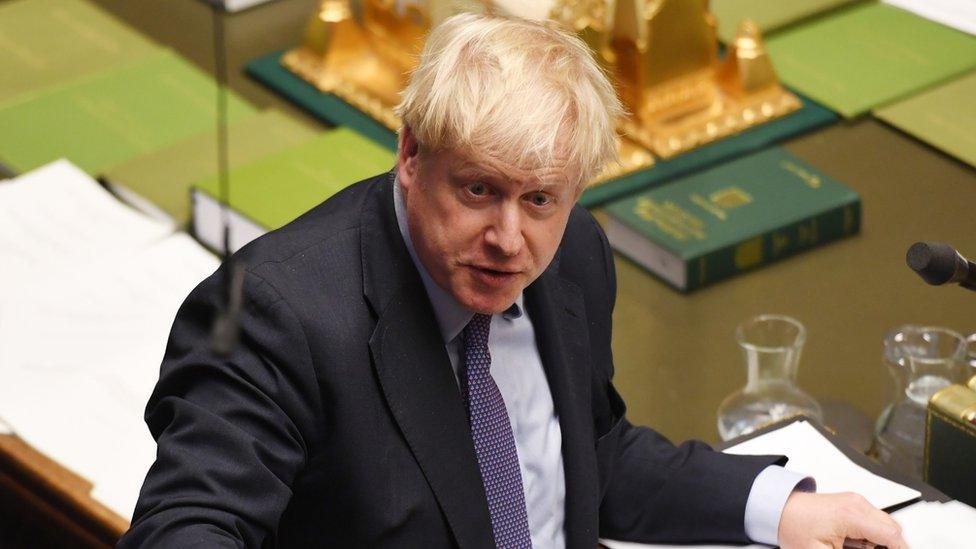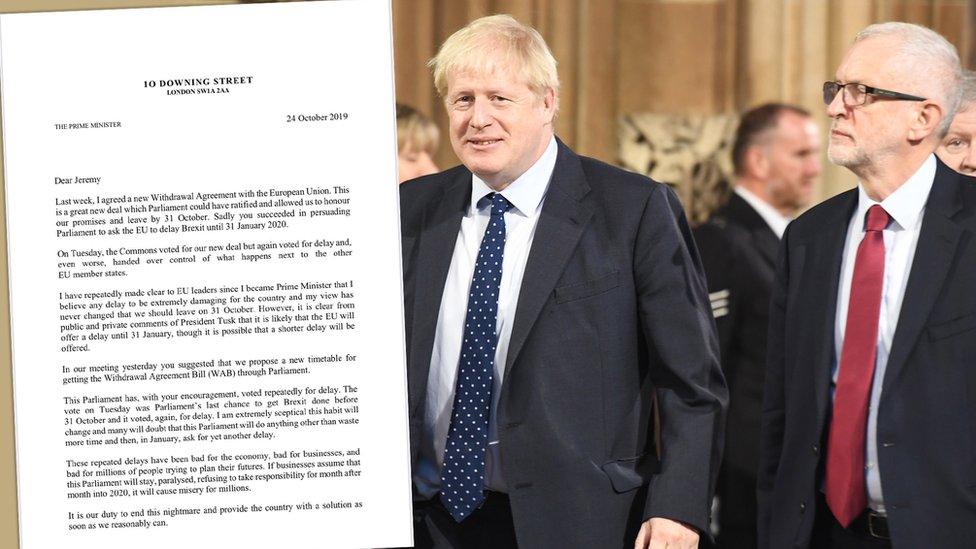Brexit: How will Labour respond to PM's gambit?
- Published
Jeremy Corbyn: Take no-deal off the table and we absolutely support a general election
He did it, sort of. The prime minister has said he'll ask MPs to back an election in seven weeks time, just in time for Christmas.
The government's laying the motion tonight to hold the vote on Monday, trying to lay down the gauntlet to the opposition parties, who can keep him trapped in Number 10 if they like.
Remember this time last week there was delight in Downing Street that they had overcome expectations and agreed a deal with the EU.
But that euphoria fell away on that side of the argument, when MPs booted out the timetable to debate and pass all the new laws that would actually make Brexit happen.
For some of those objecting, it's a part of the ruse to stop our departure. But many others had what they considered entirely legitimate concerns about the speed with which he was trying to ram it through
Number 10's wheeze now is to dangle the offer of a few extra days of scrutiny to get it through, but only if MPs give in to Boris Johnson's other demand, backing to go to the ballot box soon after.
'Have the extra time you called for, but only if I get my ultimate prize' he's asking Parliament.
Downing Street knows full well however that opposition MPs are unlikely suddenly to swoon for this new timetable, it is hardly much extra time for scrutiny.
And while there are cabinet ministers who reckon it would be better to try as hard as possible with the bill, calmly and on a more conventional timetable, the dominant view in government is that there really is not a serious chance of the Brexit legislation getting through unmangled, so the only way, reluctantly for some, is to push the button for an election.
And this is where it gets very sticky for the government.
What happens next is partly dependent on exactly how the EU responds to the UK request for delay to Brexit.
That will become clear either on Friday or Monday. Although President Macron is understood to be on board for a short extension that would focus the minds, apparently texting as much to the prime minister on Thursday, the wider view in the EU is not expected to fall in line with that.
You can read more about how the EU is likely to handle it from Katya in Brussels here.
Precisely how they respond will shape the opposition parties' next moves. They might even, whisper it, come up with a fudge.
Boris Johnson cannot be remotely sure Labour and the smaller parties will let him have his way. The SNP and the Lib Dems are both tempted to go for an election as soon as a three month delay is agreed.
The Labour Party's official position has always been that they would agree to an election, in fact officially they are chomping at the bit, like the other parties, as long as a delay is agreed.
One senior member of the shadow cabinet predicted they would not be able to withstand the pressure if the Lib Dems and the SNP said yes.
The PM says an early poll would create a "credible" deadline for passing a Brexit deal
Jeremy Corbyn himself, and certainly one group in his camp, are understood to be very tempted too. But, just as in 2017, lots of Labour MPs are horrified at the idea, partly because of Labour's standing in the polls.
But also, there are senior shadow cabinet ministers who believe the smart thing would be to leave the PM in his purgatory, twisting, unable to get his bill through, unable to get to an election.
In short, the position is fluid, and Labour is having words with itself tonight.
'Like a boa constrictor'
Plenty of Tory MPs worry that Labour will pursue precisely a delaying tactic - "like a boa constrictor they will slowly squeeze Boris until his novelty fun factor starts to grate".
If Boris Johnson therefore is totally and utterly stuck in a few days time, he in turn vows that he would raise the temperature even higher, to turn an already fraught and bizarre situation into something completely extraordinary, making MPs vote day after day after day on whether or not to have an election, and bringing forward no business to the House of Commons - the government going on a form of political strike.
The belief in Number 10 is that while it might be hellish getting there, in the end the logic moves towards the opposition allowing an election, in the end.
(There are also other ways you might remember to get there - a one line bill, a vote of no confidence - methods that Number 10 would also be willing to try, where they only need a majority of one vote, rather than two-thirds majority he needs under the election legislation.)
Either way, the opposition's final responses to the prime minister's gambit tonight are not final. They will wait to see exactly what the EU says.
What is obvious though is that the prime minister's 'do or die' Brexit deadline has disappeared. Whether his vow to get an election is one he is able to keep is also not in his control.
There will be no budget, there may not be an election, and there may not be Brexit any time soon, and depending what happens next there may not really be a government either in any traditional sense of the word.
- Published23 October 2019

- Published23 October 2019
- Published22 October 2019

- Published24 October 2019

